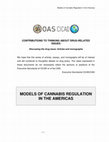Papers by Milton Romani Gerner

We hope that this series of articles, essays, and monographs will be of interes and will contribu... more We hope that this series of articles, essays, and monographs will be of interes and will contribute to thoughtful debate on drug policy. The views expressed in these documents do not necessarily reflect the opinions or positions of the . Executive Secretariat CICAD/OAS
The new models are being implemented at a speed that far surpasses the slow
progress of political and diplomatic reflection. As has been insinuated, the pressing need
for change, in view of the shortcomings, flaws, and negative effects of current models,
drives dynamism and urgent calls for a new chapter of debate, follow-up, monitoring,
and evaluation. The idea is not just to launch yet another program, but rather to bring
about a radical change in the control and oversight of psychoactive substances: as is
oft-repeated, even to the point of excess, a paradigm shift.
We began designing this report in January of 2017. From then until it was written in
June of that same year, laws on the medical use of cannabis were passed in Argentina,
Colombia, Mexico, and Puerto Rico, joining the ones already in force elsewhere.
Naturally, some voices rightfully argue about the political and health-related
suitability, legitimacy, legality, expediency, and effectiveness of these new models.
Some spheres even emphatically reject the use of the expression “new models and/or
approaches,” in an effort to, through rather magical thinking, pretend they do not exist.
Another example of efforts to block dialogue is that despite the evidence available, it
has been impossible to incorporate the terminology “harm reduction,” let alone the
approach and practices entailed.
The right to have one’s own point of view on the advisability, advantages, and
disadvantages of these endeavors is just that: a right. But in multilateral forums and
organizations, we do not always have the opportunity to calmly analyze, without
ideological baggage, sterile fundamentalist views or dogmas, the pros and cons of these
models.
Artículos, documentos monográficos y ensayos de lectura como contribución a la reflexión y el deb... more Artículos, documentos monográficos y ensayos de lectura como contribución a la reflexión y el debate en materia de drogas Confiamos en que esta serie de artículos, ensayos y documentos monográficos de lectura sean de su interés y contribuyan a la reflexión y debate sobre las políticas sobre drogas. Lo expresado en estos documentos no es necesariamente reflejo de la opinión o posición de la SE-CICAD ni de la OEA sobre las materias aquí tratadas. Secretaría Ejecutiva de CICAD/OEA MODELOS DE REGULACIÓN DE CANNABIS EN LAS AMÉRICAS









Uploads
Papers by Milton Romani Gerner
The new models are being implemented at a speed that far surpasses the slow
progress of political and diplomatic reflection. As has been insinuated, the pressing need
for change, in view of the shortcomings, flaws, and negative effects of current models,
drives dynamism and urgent calls for a new chapter of debate, follow-up, monitoring,
and evaluation. The idea is not just to launch yet another program, but rather to bring
about a radical change in the control and oversight of psychoactive substances: as is
oft-repeated, even to the point of excess, a paradigm shift.
We began designing this report in January of 2017. From then until it was written in
June of that same year, laws on the medical use of cannabis were passed in Argentina,
Colombia, Mexico, and Puerto Rico, joining the ones already in force elsewhere.
Naturally, some voices rightfully argue about the political and health-related
suitability, legitimacy, legality, expediency, and effectiveness of these new models.
Some spheres even emphatically reject the use of the expression “new models and/or
approaches,” in an effort to, through rather magical thinking, pretend they do not exist.
Another example of efforts to block dialogue is that despite the evidence available, it
has been impossible to incorporate the terminology “harm reduction,” let alone the
approach and practices entailed.
The right to have one’s own point of view on the advisability, advantages, and
disadvantages of these endeavors is just that: a right. But in multilateral forums and
organizations, we do not always have the opportunity to calmly analyze, without
ideological baggage, sterile fundamentalist views or dogmas, the pros and cons of these
models.
The new models are being implemented at a speed that far surpasses the slow
progress of political and diplomatic reflection. As has been insinuated, the pressing need
for change, in view of the shortcomings, flaws, and negative effects of current models,
drives dynamism and urgent calls for a new chapter of debate, follow-up, monitoring,
and evaluation. The idea is not just to launch yet another program, but rather to bring
about a radical change in the control and oversight of psychoactive substances: as is
oft-repeated, even to the point of excess, a paradigm shift.
We began designing this report in January of 2017. From then until it was written in
June of that same year, laws on the medical use of cannabis were passed in Argentina,
Colombia, Mexico, and Puerto Rico, joining the ones already in force elsewhere.
Naturally, some voices rightfully argue about the political and health-related
suitability, legitimacy, legality, expediency, and effectiveness of these new models.
Some spheres even emphatically reject the use of the expression “new models and/or
approaches,” in an effort to, through rather magical thinking, pretend they do not exist.
Another example of efforts to block dialogue is that despite the evidence available, it
has been impossible to incorporate the terminology “harm reduction,” let alone the
approach and practices entailed.
The right to have one’s own point of view on the advisability, advantages, and
disadvantages of these endeavors is just that: a right. But in multilateral forums and
organizations, we do not always have the opportunity to calmly analyze, without
ideological baggage, sterile fundamentalist views or dogmas, the pros and cons of these
models.